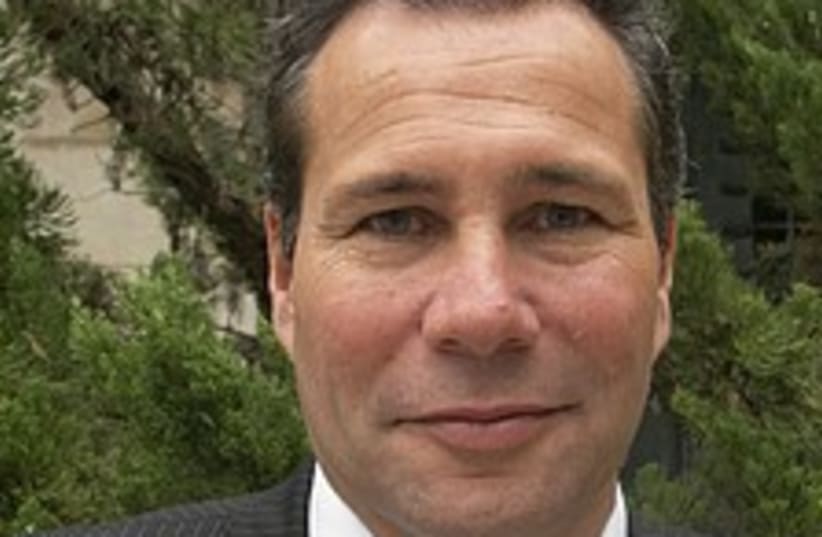Prosecutor: Terrorist's assassination not justice
Prosecutor who worked to arrest Mughniyeh for '94 bombings would rather have seen him in court.
Alberto Nisman, the Argentinean prosecutor who last year secured Interpol backing for the arrest of Hizbullah's "special operations" chief Imad Mughniyeh over the 1994 Buenos Aires Jewish community offices bombing, said Wednesday that he felt no sorrow over Mughniyeh's death, but neither did he feel that justice had been served.
In a telephone interview from Buenos Aires, Dr. Nisman said that Mughniyeh was personally tasked by former Iranian intelligence minister Ali Fallahian with organizing the attack at the AMIA (the Argentine Jewish Mutual Association) building, and that the Hizbullah terror chief directly coordinated preparations in the Argentinean capital itself in early July 1994, leaving Buenos Aires only days before the blast.
Eighty-five people were killed in the bombing - the worst anti-Semitic attack outside Israel since the Holocaust and Argentina's worst-ever case of terrorism. Argentina also indicted Mughniyeh over the bombing of the Israeli Embassy two years earlier, in which 29 people were killed.
"Mughniyeh was being actively sought by Interpol," said Nisman, "and it would have been best if he had been brought to court, to explain what happened [in the orchestration of the bombing]. I feel no sorrow [over his death], nor the reverse. I am a prosecutor and my work is to bring people to justice. This is not justice."
Nisman urged the other suspects being sought by Interpol in the case - including Fallahian (now a senior security adviser to Iran's supreme leader, Ayatollah Ali Khamenei), Ahmad Vahidi (Iran's deputy defense minister) and Mohsen Rabbani (the former cultural attaché at the Iranian Embassy in Buenos Aires) - to give themselves up for trial. "This is not a threat," he stressed. "They should come forward and say what happened."
Persuaded by Nisman's evidence that the AMIA blast was commissioned by Iran's top leadership, Interpol last year issued "red notices" requiring member countries to assist in the arrest and extradition of the key alleged conspirators. Iran, itself an Interpol member, tried in vain to block the Interpol move and has vowed not to cooperate. Mughniyeh was the only non-Iranian on the Interpol list.
Nisman said Mughniyeh's death would not undermine his case against the other suspects. He said he had no idea who was responsible for his death and that he hoped it would not prompt revenge attacks.
On a working visit to Israel in December, Nisman had urged the international community to pressure Iran into giving up the wanted men for trial. He said that the two Buenos Aires bombings were "ordered, planned and financed" by Iran's top leadership. Teheran, he told the Post, was incensed that Argentina, under former president Carlos Menem, had suspended and ultimately stopped what had been close cooperation with the Iranian nuclear program, including the training of nuclear technicians and the transfer of nuclear technology. At first Teheran tried to cajole Argentina into reconsidering, Nisman said. Then it issued threats. And finally, it employed terrorism.
The prosecutor, who took over the AMIA investigation three years ago, said he had received a telephoned death threat at his home and been warned off the case by Iran but would not desist.
In a soon-to-be-published Spanish-language book, Murder Without a Trace, author Gustavo Perednik describes a meeting in the Iranian town of Mashad on August 14, 1993, in the presence of president Hashemi Rafsanjani, at which the AMIA bombing was planned.
"Two weeks after that meeting, the Lebanese Imad Mughniyeh was appointed as commander of the operation," Perednik writes. "He was then head of Hizbullah's 'foreign service,' namely for terror attacks outside Lebanon.
"The gang selected by Mughniyeh to supervise the logistics of the bombing arrived at Ezeiza, Buenos Aires's international airport, on July 1, 1994, 17 days before the attack. Simultaneously, the suicide bomber, Ibrahim Hussein Berro, entered Argentina through the 'Triple Frontier' (the border between Brazil, Paraguay and Argentina)...
"As Berro reached Buenos Aires, Mughniyeh's group completed the final preparations [for the bombing], including the [Renault Transit to be used by the bomber, which was] bought by Mohsen Rabbani... Four hundred kilos of explosives were loaded onto the vehicle."
Berro crashed the Transit into the AMIA building on July 18, reducing the seven-story structure to rubble.
if(catID != 151){
var cont = `Take Israel home with the new
Jerusalem Post Store
Shop now >>
`;
document.getElementById("linkPremium").innerHTML = cont;
var divWithLink = document.getElementById("premium-link");
if(divWithLink !== null && divWithLink !== 'undefined')
{
divWithLink.style.border = "solid 1px #cb0f3e";
divWithLink.style.textAlign = "center";
divWithLink.style.marginBottom = "40px";
divWithLink.style.marginTop = "40px";
divWithLink.style.width = "728px";
divWithLink.style.backgroundColor = "#3c4860";
divWithLink.style.color = "#ffffff";
}
}
(function (v, i){
});

